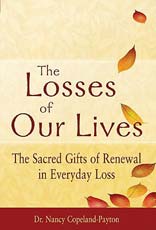"As human beings, we walk a fine line between gratefully receiving material things and creation's spaces and wanting to possess and hold them forever. Objects and places can easily become such an integral part of our self that we assume we're entitled to them. It is the gift of our continual experience of loss of things and places that keeps us grounded in the truth that we neither own — nor are we entitled to own — the things of creation. With each letting go of something or somewhere, we are reminded of their impermanence. Their loss and the persistent flow of loss teaches us to keep our hands open.
"We receive many delightful spaces and things. They come into our lives and we relish their presence. We may infuse them with memories and form attachments to them. When this happens, there may be a shift in our posture in relationship to these created objects and places. Imperceptibly, we begin to hold them tightly. Over time, we forget that neither creation nor the objects of life really belong to us.
"This is a dangerous pivot-point away from a life-giving stance of deeply reverencing things and places, holding them lightly, gratefully receiving their blessing, and relinquishing them. Our gentle acceptance covertly turns into peril when we curl our fingers around these gifts and hold them forcefully in clenched hands. It is seductively easy to believe we 'possess' and 'own' them.
"There is great risk here. We become possessed and controlled by the very things and places we covet. We succumb to siren songs. There's a sliver of dark truth in each of us, embodied by J. R. R. Tolkien's character Gollum in The Lord of the Rings. Once a graceful creature belonging to freely flowing river water, Gollum changes as he becomes obsessed with owning a ring he lost. Continually muttering to himself, he is possessed by 'my precious, my precious' ring. 'Where iss it, where iss it: my Precious, my Precious? It's ours, it is, and we wants it.'
"In the end, the gleaming circle of gold for which he grasps so desperately destroys him.
"Often, it is our deep-seated fears that provoke such acquisitive clutching of things or places. Within each of us is a strong desire for security, safety, comfort, food, and water. There are also yearnings for control — and even for power — in us all. When we're threatened with the loss of these things that we desire, fear pays us a thundering visit. Fear is the Gollum force that drives our hands to grasp and hold tightly to things and places."
